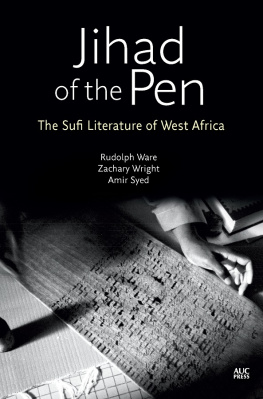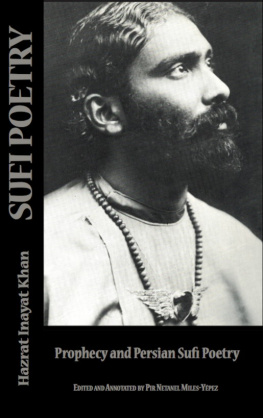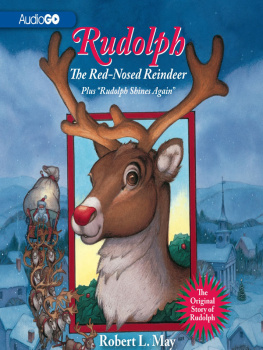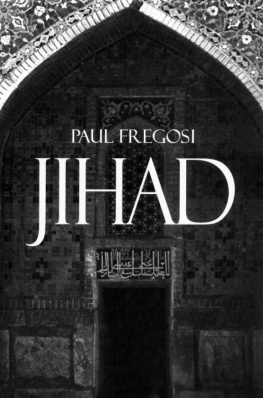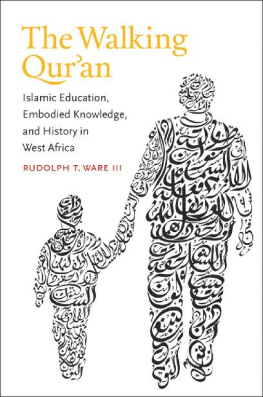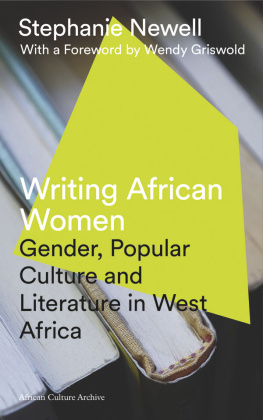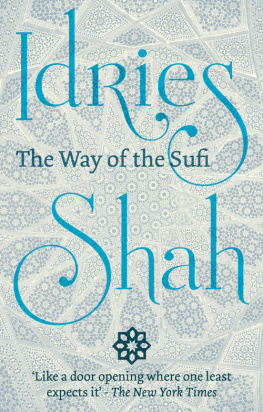Rudolph Ware - Jihad of the Pen: The Sufi Literature of West Africa
Here you can read online Rudolph Ware - Jihad of the Pen: The Sufi Literature of West Africa full text of the book (entire story) in english for free. Download pdf and epub, get meaning, cover and reviews about this ebook. year: 2018, publisher: The American University in Cairo Press, genre: Religion. Description of the work, (preface) as well as reviews are available. Best literature library LitArk.com created for fans of good reading and offers a wide selection of genres:
Romance novel
Science fiction
Adventure
Detective
Science
History
Home and family
Prose
Art
Politics
Computer
Non-fiction
Religion
Business
Children
Humor
Choose a favorite category and find really read worthwhile books. Enjoy immersion in the world of imagination, feel the emotions of the characters or learn something new for yourself, make an fascinating discovery.
- Book:Jihad of the Pen: The Sufi Literature of West Africa
- Author:
- Publisher:The American University in Cairo Press
- Genre:
- Year:2018
- Rating:5 / 5
- Favourites:Add to favourites
- Your mark:
- 100
- 1
- 2
- 3
- 4
- 5
Jihad of the Pen: The Sufi Literature of West Africa: summary, description and annotation
We offer to read an annotation, description, summary or preface (depends on what the author of the book "Jihad of the Pen: The Sufi Literature of West Africa" wrote himself). If you haven't found the necessary information about the book — write in the comments, we will try to find it.
Jihad of the Pen: The Sufi Literature of West Africa — read online for free the complete book (whole text) full work
Below is the text of the book, divided by pages. System saving the place of the last page read, allows you to conveniently read the book "Jihad of the Pen: The Sufi Literature of West Africa" online for free, without having to search again every time where you left off. Put a bookmark, and you can go to the page where you finished reading at any time.
Font size:
Interval:
Bookmark:


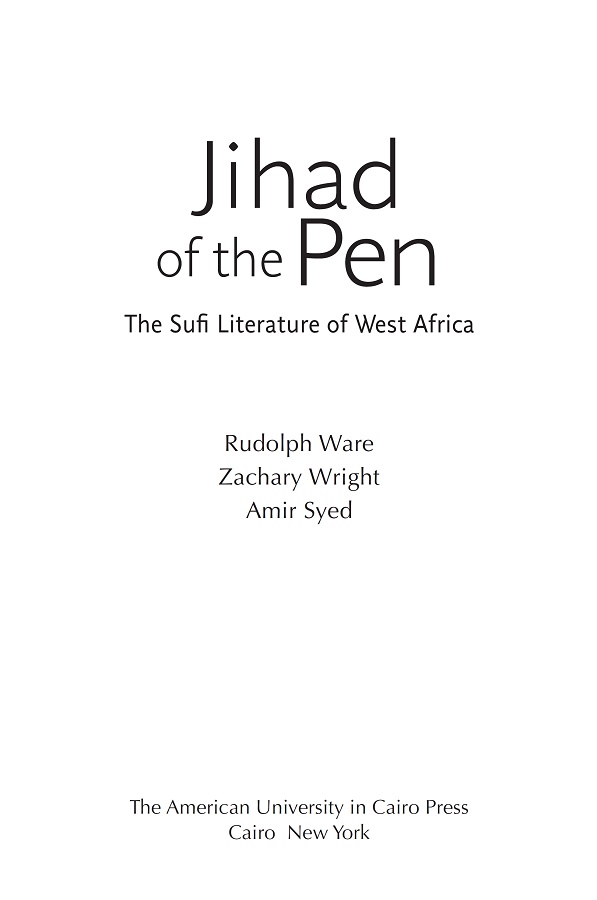
Copyright 2018 by
The American University in Cairo Press
113 Sharia Kasr el Aini, Cairo, Egypt
420 Fifth Avenue, New York, NY 10018
www.aucpress.com
First published in hardback in 2018
This electronic edition published in 2019
All rights reserved. No part of this publication may be reproduced, stored in a retrieval system, or transmitted in any form or by any means, electronic, mechanical, photocopying, recording, or otherwise, without the prior written permission of the publisher.
ISBN 978 977 416 863 5
eISBN 978 1 61797 872 2
Version 1
Zachary Wright
Rudolph Ware and Muhammad Shareef
Amir Syed
Rudolph Ware
Zachary Wright
Rudolph Ware
W e would like to acknowledge the many scholars, both Muslim ulama and Western academics, who have made accessible the Islamic scholarly tradition of West Africa to a wider readership. They are too many to name here, but this work would not have been possible without their efforts.
For previous source-work on Shehu Uthman bin Fudi, we are grateful for the efforts of Mervyn Hiskett, Murray Last, and John Hunwick. We also acknowledge the direct assistance of Aisha Bewley and Muhammad Shareef in preparing the section on Ibn Fudi.
For prior work on the writings of al-Hajj Umar Tal, we acknowledge the work of Bernd Radtke, John Hunwick, Said Bousbina, and Muhtar Holland. We also thank Kamal Husayni for making available to us unpublished drafts of Hollands translations of sections of the Rimah. We are grateful to Imam Fode Drame and Sillah Drammeh for offering translation advice on difficult passages from al-Hajj Umars writing.
Earlier work with the writings of Serin Touba Ahmadu Bamba deserving mention includes that of Cheikh Babou, Bachir Mback, and Sana Camara.
For the writings of Shaykh Ibrahim Niasse, we are thankful for the previous translation and analytical work of Shaykh Hasan Ciss, Ousmane Kane, Rdiger Seesemann, and Fakhruddin Owaisi. The explanations provided by Imam Cheikh Tijani Ciss in various interviews were also indispensable in fully understanding the writing of Shaykh Ibrahim.
For useful feedback with this manuscript at various stages, we thank Robert Launay, Brannon Ingram, Rebecca Shereikis, Oludamini Ogunnaike, Mauro Nobili, and Matthew Schumann. We are also grateful to our anonymous reviewers for their useful comments, and to Tarek Ghanem, Lucy Hanna, and the entire staff at AUC Press for believing in this project from the start and seeing it through.
We thank all of our families for putting up with yet another writing project. Wa akhir dawaina inna l-hamd li-Lah rabb al-alamin.
T he study of Islam in Africa still pays too little attention to the words of scholars. With some notable exceptions, the story of African Sufism in particular is often told from the colonial archive or from ethnographic observations. Certainly, the writings of scholars are not the only paths to knowledge about African Sufi movements, but ignoring the contents of the vast scholarly corpus that has given such movements their unique vitality is a problem. In this historiography, great shaykhs are often seendepicted as mystics, spiritual trainers, and charismatic figuresbut seldom heard. The near absence of their authorial voices leaves a void at what should be the heart of an intellectual history. This volume, building on a new generation of research that continues to explore the rich Arabic source material of Islamic Africa, aims not just to give voice to this Islamic scholarship in Africa, but to pass it the microphone.
Ongoing work to catalogue the rich textual tradition of Islamic Africa is important to document the breadth of intellectual production, but some have tended to fetishize the presence of manuscripts over the content of those manuscripts. For Sufism in Africa, the content of these writings acquires heightened significance. For many, Sufism remains representative of an oral, emotive religious identity against which the more scholarly textual production was recorded. Discussing global Islamic movements in sub-Saharan Africa, one academic wrote:
A second type of pan-Islamic network which has been [and still is] influential [in Africa] is that created by the Sufi congregations (tariqas), that stress spiritual rather than intellectual knowledge, a feature that has enabled them to become mass movementsin a sense the churches of Islam.
Besides racialized assumptions about the inherent emotional disposition of black African Muslims, such unfortunate perceptions depend on ignoring the vibrant intellectual exchange of African Sufi scholars, most of which was written in flawless classical Arabic prose or poetry. This volume collects some of the key sources relating to Sufism in Africa, and forces researchers to consider Sufi scholars at the center of Islamic intellectual history in West Africa.
This is of course not the first collection of Arabic source material relating to West African Islam. But it is one of the few to offer multiple writings of African Muslim scholars, side by side with each other. The reader will quickly notice that the seminal Sufi sages of Africa were influenced by a similar intellectual tradition rooted both in global Islamic scholarship and more regional writings. Recurrent names include the likes of Abu Hamid al-Ghazali (d. 1111, Khurasan), Ibn Ata-Allah (d. 1309, Egypt), Jalal al-Din al-Suyuti (d. 1505, Egypt), Muhammad al-Yadali (d. 1753, Mauritania), and Mukhtar Kunti (d. 1811, Mali/Mauritania). West African scholars were also interested in similar questions. Notable themes shared by the writers in this volume include the importance of etiquette (adab), reflection on education (tarbiya), love and emulation of the Prophet Muhammad, the remembrance (dhikr) of God, and the acquisition of divine knowledge (marifat Allah). While contemporary writers rarely mentioned each other by name, they clearly read each others works and were inspired by them. This volume allows readers to consider the complementary insights of writers in dialogue with each other, and thus to perceive the broader currents of Islamic intellectual history in Africa.
Four Saintly Biographies
Between them, Uthman bin Fudi, Umar Tal, Ahmadu Bamba, and Ibrahim Niasse founded the largest Muslim communities in West African history. Together, they command the allegiance of a majority of Muslims in the region to this dayand are at least partly responsible for the continued flourishing of Sufism in Africa when it has sometimes become marginalized elsewhere in the Muslim world. While the full biographies of each are available elsewhere, their writings deserve to be situated in a few words of introduction on their saintly biographies. Certainly, the personality and physical presence (dhat) of the saint, said to transmit knowledge to disciples beyond words and even beyond death,scholars articulated and their individual missions that framed their students understanding of their writings.
Uthman bin Fudi (17541817)
The shehus saintly authority was partly substantiated through visionary encounters with the Prophet Muhammad and past saints such as Abd al-Qadir al-Jilani (d. 1166, Baghdad). In one such vision he received his own set of litanies
Font size:
Interval:
Bookmark:
Similar books «Jihad of the Pen: The Sufi Literature of West Africa»
Look at similar books to Jihad of the Pen: The Sufi Literature of West Africa. We have selected literature similar in name and meaning in the hope of providing readers with more options to find new, interesting, not yet read works.
Discussion, reviews of the book Jihad of the Pen: The Sufi Literature of West Africa and just readers' own opinions. Leave your comments, write what you think about the work, its meaning or the main characters. Specify what exactly you liked and what you didn't like, and why you think so.

